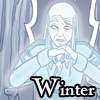Seasons
Dancer-in-the-Dawn

Merrily she dances through the fresh dew
To greet the sun and a day starting new.
Laughter bubbles like a spring when she nears
And in each footprint a flower appears.
Dancer-in-the-Dawn is a playful manitou that represents the the spirit of spring. She heralds the warming days of the year when the hours of sunlight are longer and the last of winter's snows melt away. She embodies growth without restraint, unjaded optimism, and youth untempered by age and wisdom. Her favorite time of day is the dawn, and she is only encountered at sunrise. Because of her attachment to the dawn, many philosophers associate her with the east, although in truth she follows the breaking of day across the world. She assumes the shape of a young girl, though the exact appearance changes from day to day. She laughs and sings but never talks. She is in constant motion — dancing, playing, running — for her season is the time of beginnings. And there is just so much to do.
Evensong Bard

I hear him calling with the fleeting sun,
His song of ease when the labors are done.
Trees drape him in fading crimson and gold,
While shadows stretch long as the day grows old.
Evensong Bard (sometimes called The Evensong Bard, as if the name were a title) is a gentle manitou who represents the spirit of autumn. He is the respite at the end of the day and embodies the reward for a day, a year, or even a life of labor. He is the a patron of plenty, for autumn is the time of the harvest when the earth gives up her bounty to those with patience and dedication. He embodies the wisdom of a lifetime of experiences, as he reflects upon what has gone before. Philosophers associate him with the west, as he finds his home in the twilight, and his songs can only be heard when the sun sets. The bard appears as a handsome, mature man with a weathered countenance. He can play a wide variety of instruments, but his favorite is the harp. He is often lost in thought as he ponders the meanings and lessons of life fully lived. There is an undercurrent of sadness to his melodies as winter, darkness, and the death of the year are approaching.
Father Winter

A howling wind heralds his bleak approach,
And with each soft step, ice and snow encroach,
Burdened by regrets and hopes dead too soon
Lost in memories polished as the moon.
First appearance: Feathers and Frost, Page 2
One of the most powerful manitou in existence, Father Winter (sometimes called Old Man Winter) is the manifestation of the season in Everique. He is a spirit of water and air who is renowned for his almost cruel dispassion toward any mortals he encounters. Father Winter lives beyond the North Wind in a great mansion carved out of the heart of a glacier. He commands the winds that blow down from the north, bringing snow, frost, and ice with him wherever he travels. Fortunately for all living things, Father Winter weakens quickly and must return to his home to rest and recover, limiting the extent of his reach. He is spiritually related to many of the winter manitou in Everique, and they refer to him as their father. As a manitou, he could not beget them in the conventional sense, but they defer to him and often seek his wisdom. In return, Winter cherishes his "children" and protects them from Sun-in-Splendor, a manitou manifestation of summer who lairs far to the south.
Sun-in-Splendor

How bright she burns in glorious majesty,
Crowned in brilliant fire and intensity.
She chases the sky with leonine grace,
Reveling in strength and quickening pace.
Sun-in-Splendor (sometimes called The Sun-in-Splendor as if the name was a title) is the manitou who represents the season of summer and whose power and reach rival that of Father Winter. The two trade influence over the temperate zone of the north. It is likely that Sun-in-Splendor does the same with Father Winter's counterpart in the south (Or perhaps Father Winter rules simultaneously from both poles. Such things are possible with manitou). Sun-in-Splendor is a spirit of fire and air, who brings the warm winds of the south, the brilliant sun, and the lengthening days. In her carelessness, she also brings blistering heat, sunstroke, and drought. While she lives at the Equator on a volcanic island that rises in majesty above a trackless sea, she travels far and wide. She is free with her favors and, unlike Father Winter, she is capable of mating with mortals, though the act of passion consumes her mates. The resulting spirit children can be found throughout Corthis. Sun-in-Splendor is flighty by nature and does not pay much attention to her offspring, allowing them to wander and do as they please, nor does she come to their aid if they are in need.
« Return to the Almanac Index


